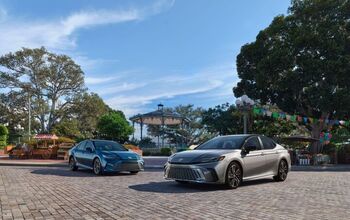Win Some, Lose Some: Detroit Predicted To Give Up Most Gains This Year

Gains in market share, that is. It’s market share that counts. That perplexing axiom had been drummed into me in the many decades I spent on the other side. You need to be faster than the overall market, or you fall behind. Of course, you can gain share by giving away cars, but you won’t do that for long.
Detroit had a big comeback last year. Let’s look how big. And let’s discuss whether Bloomberg is right when it predicts that “U.S. automakers led by General Motors Co. may lose share in their home market this year.”
U.S. Automakers By Market Share Gain/Loss 2011
AutomakerUnits 2011Share 2011Units 2010Share 2010Share changeChrysler Group1,369,11410.71%1,085,2119.36%1.35%Hyundai Group1,131,1838.85%894,4967.72%1.13%General Motors2,503,79719.59%2,211,69919.08%0.51%Volkswagen443,8403.47%359,8893.11%0.37%Volvo Cars67,2400.53%21,4230.18%0.34%4.4%Nissan1,042,5348.16%908,5707.84%0.32%Mitsubishi79,0200.62%55,6830.48%0.14%Daimler AG267,0162.09%230,9341.99%0.10%BMW Group305,7662.39%266,2692.30%0.10%Porsche29,0230.23%25,3200.22%0.01%JLR50,3750.39%45,2040.39%0.00%Saab5,6100.04%4,8380.04%0.00%Maserati2,3210.02%1,8970.02%0.00%Suzuki26,6180.21%23,9940.21%0.00%Other2,9670.02%2,8970.02%0.00%Mazda250,4261.96%229,5661.98%-0.02%Ford2,143,10116.77%1,964,05916.95%-0.18%Subaru266,9892.09%263,8202.28%-0.19%-4.4%Honda1,147,2858.98%1,230,48010.62%-1.64%Toyota1,644,66012.87%1,763,59515.22%-2.35%TOTAL12,778,885100%11,589,844100%These are automakers, ranked by their gain (or loss) of share in the U.S. market for the full year of 2011. The big gainers are Chrysler and Hyundai (incl Kia,) followed by GM and Volkswagen. “Big gainers” is relative. Each of the carmakers on top of the list had double digit (in the case of Volvo even triple digit) growth rates. However, when the year was over, the ten carmakers that gained market share only dislodged a combined 4.4 percent of the market. Who lost it?
Let’s go to the bottom of the list. There you see the tsunami victims. Toyota lost a whopping 2.35 percent of the market, more than half of the total market share that had been gained at the top of the list. Toyota is followed by most of the Japanese makers. But oops, amongst the losers is also Ford. Ford gained 9.4 percent in 2011. But with an overall market gaining 10 percent, that gain translates into a loss of share. Market share is brutal. You need to grab it from someone else. And you need to make money while you do it.
The list also provides a partial answer to the question many people asked in private after March 11: Who benefits from the tsunami?
What about this year? Bloomberg asked five analysts that very question. Bottom line answer:
“The U.S. automakers may each increase sales by less than the total market’s growth this year, according to all five analysts surveyed. While falling unemployment, rising consumer confidence and the need to replace aging vehicles will drive demand, increased Japanese output and improved competition from Korean brands and Volkswagen AG will test Detroit’s discipline on protecting profit rather than simply selling products.”
The analysts think that the Detroit Three “may drop a combined 1.3 percent of U.S. market share in 2012.”
That may not sound like a lot. Consult the table, and you will see that it would eat up most of the gains two of the three made in 2011. Who will take that share away? Says Bloomberg:
“Asia’s largest automaker, Toyota, may capture 13.8 percent of the U.S. market this year, from 12.9 percent last year, and Tokyo-based Honda may take 9.5 percent, from 9 percent, analysts estimate.”
That’s already 1.5 percent. Volkswagen will grab 0.3 percent, Hyundai 0.1 percent, think the analysts. Who else than the Detroit 3 is in for a haircut? Except for Nissan, which is predicted to experience a 0.2 percent slide, no other losers are mentioned in the Bloomberg story.
Who do you think will gain or lose?

Bertel Schmitt comes back to journalism after taking a 35 year break in advertising and marketing. He ran and owned advertising agencies in Duesseldorf, Germany, and New York City. Volkswagen A.G. was Bertel's most important corporate account. Schmitt's advertising and marketing career touched many corners of the industry with a special focus on automotive products and services. Since 2004, he lives in Japan and China with his wife <a href="http://www.tomokoandbertel.com"> Tomoko </a>. Bertel Schmitt is a founding board member of the <a href="http://www.offshoresuperseries.com"> Offshore Super Series </a>, an American offshore powerboat racing organization. He is co-owner of the racing team Typhoon.
More by Bertel Schmitt
Latest Car Reviews
Read moreLatest Product Reviews
Read moreRecent Comments
- Jalop1991 In a manner similar to PHEV being the correct answer, I declare RPVs to be the correct answer here.We're doing it with certain aircraft; why not with cars on the ground, using hardware and tools like Telsa's "FSD" or GM's "SuperCruise" as the base?Take the local Uber driver out of the car, and put him in a professional centralized environment from where he drives me around. The system and the individual car can have awareness as well as gates, but he's responsible for the driving.Put the tech into my car, and let me buy it as needed. I need someone else to drive me home; hit the button and voila, I've hired a driver for the moment. I don't want to drive 11 hours to my vacation spot; hire the remote pilot for that. When I get there, I have my car and he's still at his normal location, piloting cars for other people.The system would allow for driver rest period, like what's required for truckers, so I might end up with multiple people driving me to the coast. I don't care. And they don't have to be physically with me, therefore they can be way cheaper.Charge taxi-type per-mile rates. For long drives, offer per-trip rates. Offer subscriptions, including miles/hours. Whatever.(And for grins, dress the remote pilots all as Johnnie.)Start this out with big rigs. Take the trucker away from the long haul driving, and let him be there for emergencies and the short haul parts of the trip.And in a manner similar to PHEVs being discredited, I fully expect to be razzed for this brilliant idea (not unlike how Alan Kay wasn't recognized until many many years later for his Dynabook vision).
- B-BodyBuick84 Not afraid of AV's as I highly doubt they will ever be %100 viable for our roads. Stop-and-go downtown city or rush hour highway traffic? I can see that, but otherwise there's simply too many variables. Bad weather conditions, faded road lines or markings, reflective surfaces with glare, etc. There's also the issue of cultural norms. About a decade ago there was actually an online test called 'The Morality Machine' one could do online where you were in control of an AV and choose what action to take when a crash was inevitable. I think something like 2.5 million people across the world participated? For example, do you hit and most likely kill the elderly couple strolling across the crosswalk or crash the vehicle into a cement barrier and almost certainly cause the death of the vehicle occupants? What if it's a parent and child? In N. America 98% of people choose to hit the elderly couple and save themselves while in Asia, the exact opposite happened where 98% choose to hit the parent and child. Why? Cultural differences. Asia puts a lot of emphasis on respecting their elderly while N. America has a culture of 'save/ protect the children'. Are these AV's going to respect that culture? Is a VW Jetta or Buick Envision AV going to have different programming depending on whether it's sold in Canada or Taiwan? how's that going to effect legislation and legal battles when a crash inevitibly does happen? These are the true barriers to mass AV adoption, and in the 10 years since that test came out, there has been zero answers or progress on this matter. So no, I'm not afraid of AV's simply because with the exception of a few specific situations, most avenues are going to prove to be a dead-end for automakers.
- Mike Bradley Autonomous cars were developed in Silicon Valley. For new products there, the standard business plan is to put a barely-functioning product on the market right away and wait for the early-adopter customers to find the flaws. That's exactly what's happened. Detroit's plan is pretty much the opposite, but Detroit isn't developing this product. That's why dealers, for instance, haven't been trained in the cars.
- Dartman https://apnews.com/article/artificial-intelligence-fighter-jets-air-force-6a1100c96a73ca9b7f41cbd6a2753fdaAutonomous/Ai is here now. The question is implementation and acceptance.
- FreedMike If Dodge were smart - and I don't think they are - they'd spend their money refreshing and reworking the Durango (which I think is entering model year 3,221), versus going down the same "stuff 'em full of motor and give 'em cool new paint options" path. That's the approach they used with the Charger and Challenger, and both those models are dead. The Durango is still a strong product in a strong market; why not keep it fresher?


































Comments
Join the conversation
Toyota and Honda are already showing gains since rebuilding after the tsunami. They should both show gains for the year, although those could come at the expense of margin, so that won't be entirely good. Hyundai and VW seem intent on taking on Honda and Toyota, and may also gain some share in the process. The losers in the Honda-Toyota-Hyundai-VW wars will probably be marginal brands such as Mitsubishi and Mazda. They may take a hit to share, although they have little share to lose. Ford seems intent of building margin with their retail sales, at the expense of retail volume. I would expect them to remain pretty flat overall, although fleet sales should remain high. Chrysler may gain a bit, barring a surge in oil prices, with the Jeep brand vehicles and the new Dart. I don't see GM gaining for the year. Nothing in the current line up stands out as having much potential for sales gains beyond their current levels. They might slide a bit, although knowing GM, they'll move the excess volume to fleet in order to maintain the sales numbers.
Since we already have troops in Japan and Korea I suggest Japan and Korea to join Union as 51st and 52nd states. Then HK and all Japanese companies become American companies and viola - America is a manufacturing superpower again! As another plus Democrats will become unbeatable since Koreans and Japanese always vote for Demos.